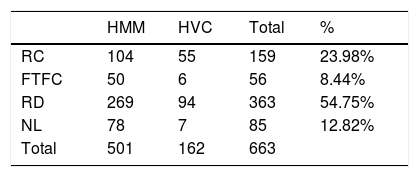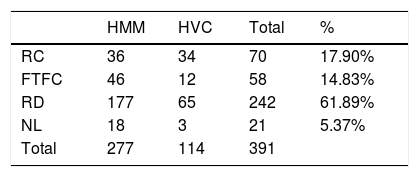To describe how the ENT and Head and Neck departments of the HMM and HVC hospitals were managed during the COVID-19 state of alert and to analyse the results obtained to assess the usefulness of telephone consultations in our specialty.
Material and methodsFrom March 16, the ENT and Head and Neck departments of the HMM and HVC Hospitals began telephone consultations. Due to the disparity in the actions of the different department members, the decision was made to create a protocol to manage these consultations which started to be implemented March 23.
ResultsDuring the study period, 1054 patients were attended in the consultations of both departments; 663 (62.9%) were first visits and 391 (37.10%) were successive visits. Twenty-one percent (229) of the consultations could be resolved by telephone, 10.82% (114) required face-to-face care, 57.40% (605) were indicated for an on-demand check-up depending on their disease course, and 10.05% (106) of the patients could not be reached by telephone.
DiscussionThe state of alarm caused by COVID-19 has been a determining factor in how we undertake our care work. In the ENT and Head and Neck departments of the HMM and HVC Hospitals we decided to carry out consultations by telephone as an alternative to the traditional consultation. During this period, we have observed that up to 21.73% of the consultations could be dealt with by telephone.
ConclusionThe telephone consultation seems to be a very useful tool to attend our patients avoiding the risk of COVID-19 infection during the state of alarm. Furthermore, according to the data analysed and the different studies, it seems a good alternative to the traditional consultation in selected patients.
Describir cómo se gestionaron las consultas de los Servicios de ORLCCC de los Hospitales HMM y HVC durante el periodo de estado de alarma debido al COVID-19 y analizar los resultados obtenidos para valorar la utilidad de la consulta telefónica en nuestra especialidad.
Material y métodosDesde el día 16 de marzo en los Servicios de ORLCCC de los Hospitales HMM y HVC comenzamos a realizar la consulta de forma telefónica. Debido a la disparidad de actuación de los diferentes miembros de los Servicios se decidió realizar un protocolo para la gestión de dichas consultas que se comenzó a aplicar el 23 de marzo.
ResultadosDurante el periodo de estudio en las consultas de ambos Servicios se atendieron 1054 pacientes, de los cuales 663 (62,9%) fueron primeras visitas y 391 (37,10%) fueron visitas sucesivas. El 21,73% (229) de las consultas se pudieron resolver de forma telefónica, el 10,82% (114) precisaron atención de forma presencial, al 57,40% (605) se les indicó revisión a demanda según la evolución de su patología y el 10,05% (106) de los pacientes no se pudieron localizar de forma telefónica.
DiscusiónLa situación de estado de alarma ocasionada por el COVID-19 ha supuesto un condicionante en el desempeño de nuestra labor asistencial. En los Servicios ORLCCC de los Hospitales HMM y HVC decidimos realizar la consulta de forma telefónica como alternativa a la consulta tradicional. Durante este periodo hemos observado que hasta un 21,73% de las consultas se pudieron solventar de forma telefónica.
ConclusiónLa consulta telefónica parece una herramienta muy útil para atender a nuestros pacientes evitando el riesgo de contagio por COVID-19 durante el estado de alarma. Además, según los datos analizados y los diferentes estudios, parece una buena alternativa a la consulta tradicional en pacientes seleccionados.







